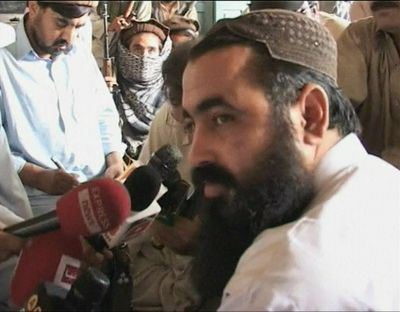Officials hail apparent killing of key terrorist
Taliban leader’s reach far beyond Pakistan

WASHINGTON – Without ever firing a shot at Americans, Baitullah Mehsud had managed to become something of an obsession for the CIA. Over 18 months, the agency tried three times to kill the stout, 5-foot-2-inch commander of the Pakistani Taliban, while spreading word of a $5 million bounty for his death or capture.
The agency apparently succeeded this week, U.S. and Pakistani intelligence officials said, when a missile launched by a CIA-operated unmanned aircraft homed in on the balcony of a villa in northwestern Pakistan where the reclusive, diabetic Mehsud was getting medical treatment.
The blast is thought to have eliminated a terrorist who was suspected to be behind the assassination of former Pakistani Prime Minister Benazir Bhutto and who was at the top of Pakistan’s most-wanted list.
Although Mehsud had been regarded primarily as a threat to that country, he was also a central figure in a network of South Asian and international terrorist groups whose operations had become increasingly coordinated in recent months. That alliance has exhibited an increasing ability – and interest – in striking targets in the West, former and current U.S. officials and terrorism experts said Friday.
“We were seeing different threat streams in the region, all coming together,” said a former senior intelligence official who helped plan counterterrorism operations. “Most of these groups had become linked under Mehsud.”
The apparently successful hit – U.S. officials acknowledged that conclusive proof may be impossible unless a body is recovered – was regarded by U.S. and Pakistani analysts as a devastating setback for the coalition of 13 Pakistani Taliban factions Mehsud had commanded, a confederation of tribally based groups linked to a half-dozen major suicide bombings in Pakistan in recent months.
Terrorism experts say his apparent death will almost certainly disrupt Taliban operations inside Pakistan in the short term, while striking at least a symbolic blow against al-Qaida as well as Taliban groups in Afghanistan.
It could also help ensure Pakistan’s backing for continued U.S. efforts to battle al-Qaida and loosely allied Taliban groups across the border in Afghanistan, sources said.
“When you take out someone who is that well-known, it creates a sense that momentum is on the side of the good guys and against the bad guys,” said Paul Pillar, a former CIA counterterrorism official. “In these conflicts, people on the ground are looking to see who’s winning and losing, because you want to be on the side of the ones who are coming out ahead.”
The missile attack has launched a struggle for succession among the Pakistani Taliban factions, said U.S. and Pakistani officials, as well as Taliban members.
While any one of a number of Mehsud’s deputies could fill the void, his apparent killing is likely to sow fear and suspicion among his followers, making unity elusive, said John McLaughlin, a former CIA deputy director.
“The survivors quarrel about tactics, strategy and future leadership, while worrying that someone ‘inside’ might have betrayed them,” McLaughlin said.
Neither the CIA nor the Obama administration has publicly confirmed the agency’s role in the airstrike, but U.S. and Pakistani officials familiar with it said the Taliban commander was killed early Wednesday by a missile launched from one of the CIA’s remotely controlled aircraft. More than 360 people have been killed in at least 31 such drone attacks this year. Although Islamabad has complained frequently about U.S. strikes, U.S. and Pakistani officials have cited the string of hits on Taliban leaders and other insurgents as evidence of improved cooperation between the countries’ intelligence agencies. Indeed, the news of Mehsud’s apparent death was widely welcomed in Pakistan.
“Pakistani and American officials are working closely to deal with a menace they both recognize,” Husain Haqqani, Pakistan’s ambassador to the United States, said in a telephone interview.
“If indeed the reports about Mehsud being killed are fully confirmed, this will be one of many events that bear evidence to the usefulness of Pakistani-U.S. cooperation.”